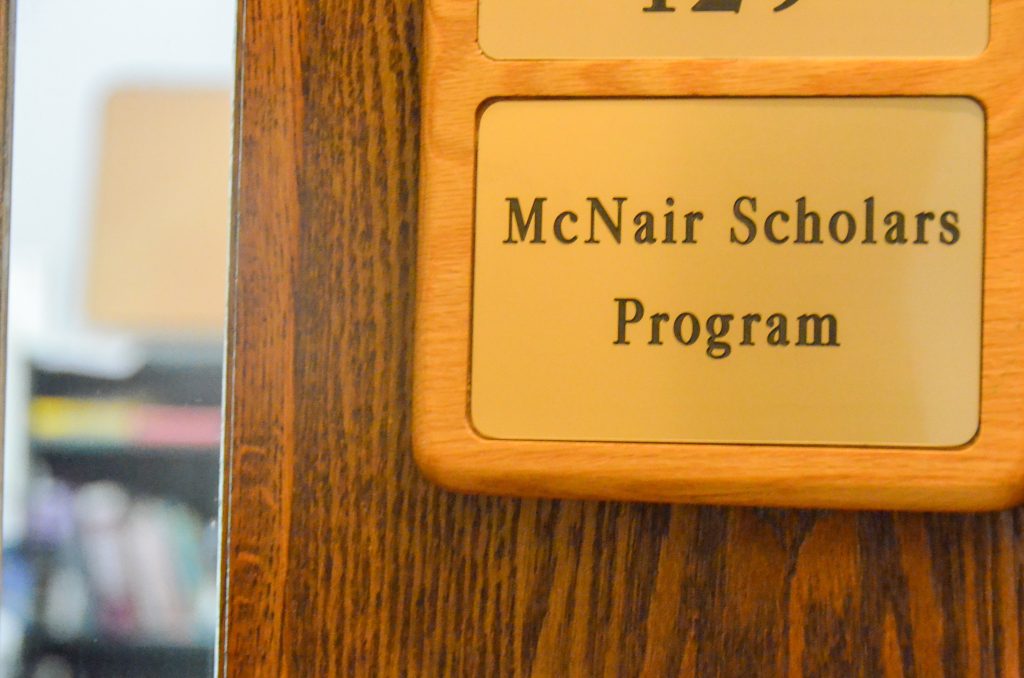Binghamton University has received a $1.4 million award to continue the McNair Scholars Program for the next five years.
The McNair Scholars Program is an eight-week, federally funded, summer research program that provides students pursuing a Ph.D. with both financial and mentorship support. The program serves students who are low-income, first-generation or a member of a historically underrepresented group. Students are provided a stipend for the program as they work one-on-one with a faculty mentor. The $1.4 million grant renewal, issued by the U.S. Department of Education (USDE), will go toward the participating students’ research programs, in addition to the salaries of two full-time staff members and a graduate assistant.
Valerie Imbruce, director of the McNair Scholars Program, said the program was named in honor of physicist Ronald McNair — the second African-American to go to space — who died during the disintegration of the Challenger Space Shuttle. The program was created by the USDE in the 1980s, where, every five years, the USDE holds an open competition for universities and colleges to launch the program on their campus.
Imbruce wrote about some of the projects that were recently completed during the program, including projects focused on social policies, and their impact on minority groups.
“We are immensely proud of the diverse research projects that our McNair Scholars have participated in,” Imbruce wrote in an email. “To give you an idea, our most recent cohort has explored Black women in leadership positions in predominantly white institutions, the legal, social and cultural impacts of the Indian Child Welfare Act, Black women and COVID-19 vaccine access, skin topography analysis over time and its applications and what therapy looks like for a stutterer. These are just a handful of topics that our scholars delved into. There are so many more!”
James Sobel, an associate professor of biology and one of the program’s faculty mentors, described his favorite aspects of the program.
“Seeing a student make it through all the challenges that a research program throws at them is really fun, but the most rewarding part is seeing a student really start believing in themselves,” Sobel wrote in an email. “Increasing diversity in science should be a goal we all share, and the McNair program is amazing at identifying and recruiting students from a wide range of backgrounds and experiences.”
BU is one of four SUNY schools, out of a total of 14 schools in New York state, to offer the McNair Program.
Sydney Werner, a senior double-majoring in comparative literature and German, did not participate in the summer research program but discussed her experience with the application process.
“Because of the requirements one must meet in order to be McNair eligible, for me being a first-generation college student and low-income, it forced me to take stock of my own identity,” Werner said. “That’s the beauty of McNair, though. We have the ability to challenge this narrative of who belongs in academia and the authoritative voices within it. I have a myriad of friends and acquaintances who also want to go into academia, but speaking to them about it never feels as comfortable as it is within the confines of the McNair classroom.”
Shuojie Teng, a senior majoring in biology and a participant in the program, conducted research on the “woodiness” trait in plants, such as monkey flowers. Teng described how he found his experience to be rewarding.
“This would be during the weekdays, which adds up to at least 30 hours a week mandated by the program,” Teng said. “I gained a lot from my experience during this program, however what I found most fruitful was the mindset and perspective I got at the end of the program. Being able to work fully on a research project throughout the summer has allowed me to hone my researching mind and how I think and approach scientific research as a whole.”



